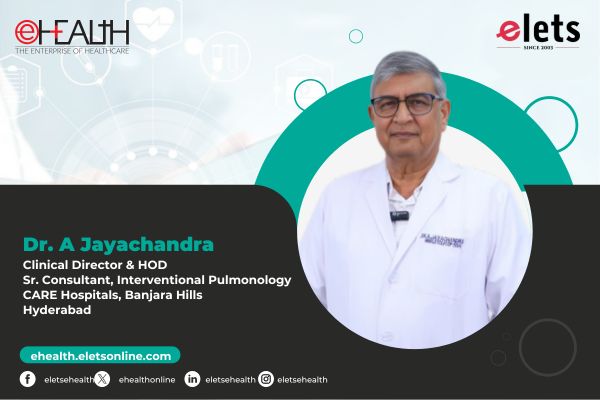
The session unfolded some cutting-edge advancements and strategies in drug discovery, emphasizing innovation in pharmaceutical and biotechnology sectors. Experts at 5th Elets Pharma Leadership Summit & Awards discussed emerging technologies like AI, genomics, and quantum computing, which expedite drug candidate identification and development. They underscore the importance of patient-centric approaches, reducing costs, and enhancing efficiency through automation and data analytics. Cross-sector collaboration, real-world data utilization, and predictive modeling are highlighted as key drivers of progress. This panel aims to unite experts from various fields to explore innovative approaches, fostering a deeper understanding of industry challenges and inspiring collaborations to drive drug discovery and healthcare innovation.

Dr. Bambulkar emphasized the importance of drug discovery in India, particularly for the survival of the pharmaceutical industry. He noted that many companies, apart from those in the Western world, struggle with drug discovery. In his previous role, he had witnessed 200 companies and licenses involved in external growth, licensing, acquisitions, and mergers at J&J, as they faced difficulties in keeping up with drug discovery efforts.

Furthermore, he pointed out that numerous drugs face setbacks due to unforeseen toxic effects, leading to a continued quest for safer and more effective drugs. The pharmaceutical industry is under immense pressure to achieve higher levels of innovation, profitability, and productivity. Consequently, various closures, mergers, acquisitions, and divestitures are being employed as strategies to address these challenges.

Dr. Ajay Singh, the Head of the mRNA Department at Gennova Biopharmaceuticals, highlighted India’s significant success in vaccine production during the COVID-19 pandemic. India became the only country to produce vaccines using all four possible platforms: live, protein subunit, DNA, and mRNA.

Dr. Singh discussed Gennova Biopharmaceuticals’ contribution to this success, launching the first indigenous mRNA-based vaccine, Jovac-19. They later introduced Jovac-OM, specifically designed to target the Omicron variant, demonstrating India’s commitment to innovation in the field.
Furthermore, Dr. Singh emphasized the evolving landscape of drug discovery, illustrating the rapid progress made in developing COVID-19 vaccines within 11 months of the virus’s genome publication. He highlighted the importance of multidisciplinary approaches in drug discovery, addressing safety and efficacy concerns while expediting the process.
Regarding personalized medicine, Dr. Singh noted the growing trend and its impact on traditional drug discovery and development. He discussed the shift from “bench to bedside” to “V to V” (body to body) approaches, where therapies are tailored to an individual’s specific genetic makeup. Dr. Singh underscored the significance of computational biology, genomics, and big data mining in delivering safe and timely personalized therapies, particularly for patients in critical conditions. He mentioned India’s potential as a substantial market for personalized medicine and highlighted the emergence of new platform technologies, such as mRNA and CRISPR, as more affordable and efficient alternatives for gene therapy and editing, contributing to the evolution of personalized therapies.
Dr. Santosh Taur, the Director of Medical Affairs for Vaccines & Digital at Pfizer Ltd, discussed the transformation of drug discovery and development. Traditionally, this process has taken 15 to 20 years from discovery to market, involving an average investment of $2.5 to $3 billion USD.
Dr. Taur highlighted the opportunities presented by technological advancements, particularly in quantum computing and genomics, which are expected to reduce drug development timelines by an average of 500 days, cut costs by 25%, and enhance efficiency.
He outlined five key pillars for achieving these improvements. Firstly, making drug discovery and development more patient-centric and healthcare professional-centric, emphasizing the importance of involving patients in the process. Genomics plays a significant role in promoting drug development for unmet medical needs.
The second pillar focuses on leveraging digital and technological enablement to automate repetitive processes, increasing efficiency in target identification and lead optimization.
The third pillar involves process redesign to enhance speed, while the fourth emphasizes an agile way of working, promoting cross-collaboration and real-time insights.
Lastly, Dr. Taur emphasized the significance of advanced analytics, such as predictive modeling, in revolutionizing drug discovery and development. These multidisciplinary advancements are poised to reshape the field of pharmaceutical science.
Be a part of Elets Collaborative Initiatives. Join Us for Upcoming Events and explore business opportunities. Like us on Facebook , connect with us on LinkedIn and follow us on Twitter , Instagram.
"Exciting news! Elets technomedia is now on WhatsApp Channels Subscribe today by clicking the link and stay updated with the latest insights!" Click here!
















